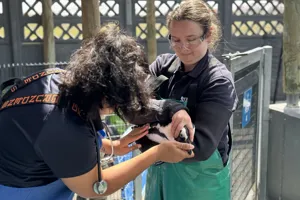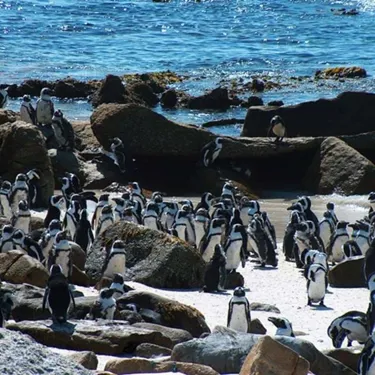- Best Price Guaranteed
- Flexible Rescheduling
- Under 2's Go Free
- SEA LIFE, Polar Adventure
Meet the coolest colony!
'Penguin Point’ is a magical opportunity to get to know our amazing Gentoo Penguins! Gentoos are the third largest species of Penguin in the world after the Emperor and Kings.

Feel the chill
The Gentoo penguin (Pygoscelis papua) is the third largest species of penguin, with only the Emperor and King penguins being larger. They are the fastest species of penguin, capable of reaching speeds of 22mph underwater.

Winter is coming!
During the winter months, you will notice that the lights in our penguin habitat will be in low light or going into a sunset cycle of reds and that the penguins will be settling in for a night’s sleep. This is to ensure we closely match the conditions found in the Southern Hemisphere – where Gentoo penguins are found. The variation in light cycles and temperature is designed to encourage their natural seasonal behaviour including a yearly moult, nesting, and breeding. At this time of year, that means the sun sets earlier at Penguin Point. This practice is based on years of worldwide experience in maintaining the best possible conditions and to ensure that Gentoo penguins breed successfully.

Love is in the air
The Gentoo Penguin is monogamous, so two penguins will pair for a breeding season and share all the responsibilities of nest building, nest guarding, egg incubation and the rearing of offspring equally, and they are found to bow to each other to cement their pair-bond. It is not uncommon for penguins to mate for life, but on average a pair will stay together for around three breeding seasons before finding a new partner.

Penguins are playful!
They love to slide down icy patches on their bellies and take turns to dive into the ocean. Did you know their black and white pattern is a form of camouflage? It helps them blend in with the water and keep safe from predators.
Penguin Behaviours!
Penguins are extremely active and social creatures and display lots of different behaviours. Discover some of the natural behaviours you may spot of colony displaying on your next visit!

Swimming
This behaviour consists of the penguins entering the water for more than 3 minutes to be classified as swimming.

Bowing
This behaviour consists of a penguin lowering its head to another penguin. Bowing is a mutual acceptance of individuals in the colony who they share a close bond with.

Singing
Singing is a behaviour which can be identified by penguins pointing their beaks in the air and producing a loud trumpet like noise.

Resting
Penguins can be witnessed laying, flat on their stomach with wings outstretched for balance.

Courting
This behaviour involves two penguins mimicking or mirroring each other. It can also involve nest building, singing to each other and chattering their beaks together.

Fighting
Penguins may be seen biting and chasing each other

Feeding
Feeding may occur by penguins feeding each other, for example, parents with their chicks or keepers who are actively feeding the penguins. This may occur on the ice or in water.

Feathers off
The Gentoo’s go through a process called a "catastrophic moult". Once a year they lose all their feathers all in one go, and replace them with a brand new set. During this period, they may not eat for around 2 weeks. They eat lots of extra food and gain a lot of weight beforehand to make sure they have adequate energy reserves for this process.

Let's swim
Penguins are found almost exclusively in the southern hemisphere. They are ‘flightless’ birds but they can soar through the water like a torpedo to catch fish! They eat fish, squid and shrimp in the wild. The colour in the shrimp they eat is what makes their feet and beaks orange. They also They feed their chicks by regurgitating partially digested food straight into their mouths. YUCK!

Penguins in danger
Over half of all penguin species are listed as endangered. Penguin populations are threatened by oil spills, bycatch, overfishing, habitat loss and climate change.
There are a number of threats to Gentoo penguins in particular - namely unsustainable fishing practices depleting their food sources and marine pollution (causing them to ingest plastics).
To help our feathered friends, be sure to choose sustainable seafood and reduce single use plastic by switching to reusable products.

Life in the cold
Gentoos in the wild live in one of the harshest landscapes on the planet, so this species is specially adapted to life in the cold. Their body is covered in an insulating layer of blubber and they eat lots of fish to maintain it. They also have a layer of woolly, insulating feathers covered by a second layer of smooth, waterproof feathers which helps to keep the warm in and the cold water out. Our penguin home has been specially designed to keep Gentoo Penguins cool and comfortable.

Conservation
Gentoo penguins live on sub-Antarctic islands that are quite mountainous and surrounded by low lying pebble beaches. It is on these beaches that the penguins make their home - however due to climate change that is now under threat. As the ice caps melt and the sea levels rise, these pebble beaches become slowly but surely covered leaving the penguins with a smaller and smaller space to live. We can all do our bit to reduce the impact of climate change. Switch off electronics when they are not in use, turn off lights and use alternative transport options like a bike or train.

Helping penguins in the wild
The African Penguin is a Critically Endangered species of penguin, that’s wild population has declined over 50 percent since the late 1970s! SEA LIFE send a team of animal experts to volunteer time at Southern African Foundation for the Conservation of Coastal Birds (SANCCOB). Located in Cape Town, South Africa, SANCCOB aim to reverse the decline the African Penguin population through rescue, rehab and release of ill, injured or abandoned birds.
You can help African penguins by supporting penguin conservation groups like SANCCOB, and by making more sustainable seafood choices at restaurants and grocery stores.
Discover some more chilly facts!

Gentoo penguin breeding programme
Since the arrival of the colony in 2014, the team have been working hard to ensure the conditions are perfect for the penguins to breed.

Guess what?!
Penguin poo is called ‘guano’!

Did you know?
Some Penguins come from very warm climates close to the equator. For example the Humboldt Penguin is found living on the coastline in Peru and Chile!

How about that!
Other species such as Emperors, Kings and Gentoos live in one of the coldest, harshest places on the planet; Antarctica!

Wow!
Gentoo penguins are nest builders, and they build their nests out of pebbles to lay their eggs into.

Smelly!
Did you know that on average, some penguins produce waste every 20 minutes?
Online from
£31
Per adult
On the day
£39
Per adult
- Entry at your chosen 15-minute time slot
- Discover species from around the world in 14 themed zones and interact with them at our public feeding, diving displays and touch pools
-
Book early & save!
Skip the Door Pricing: Tickets booked online in advance are consistently cheaper than purchasing on the day so that you can enjoy more for less.
Ticket Type Save up to 28% with Advance Booking On the day / Walk-up Adult
From £28 £39 Child (2 - 15 years)
From £25 £35 Under 2
Free Free Please note online ticket prices vary depending on available capacity and prices may fluctuate during periods of high demand.
Online from
£33
Per adult
On the day
£44
Per adult
- Enjoy the freedom to arrive at any time on the day of your choice - no rush, just adventure at your own pace!
Read more about Gentoo Penguins

Penguin Playtime: Enrichment For Our Feathered Friends!
From frozen treats to fishy treasure hunts, enrichment activities create a splash for these charismatic birds. Dive into the world of penguin playtime
Related blog posts
Inside SEA LIFE London Aquarium's Gentoo Penguin Habitat
Immerse yourself in the fascinating world Gentoo Penguins as we explore their vibrant habitat at SEA LIFE London Aquarium. Discover how our team ensures the well-being of these incredible creatures within our facility, along with our comprehensive care and conservation efforts.
Related blog posts
The underwater world of Gentoo Penguins
Dive deep with us as we explore the remarkable swimming behaviour of these agile and speedy birds, from their incredible speed and to their hunting strategies and underwater navigation.
Related blog posts
We've welcomed a fluffy new addition to our penguin colony!
SEA LIFE London Aquarium’s new penguin chick hatched on 9th June and is currently weighing in at just under 2kg
Related blog posts
Romance Blossoms as Penguins Say I-ce Do to Mark the Start of Mating Season
Love is in the air this Spring as the attraction gets ready for the start of mating season in Penguin Point for its colony of Gentoos.
Related blog posts